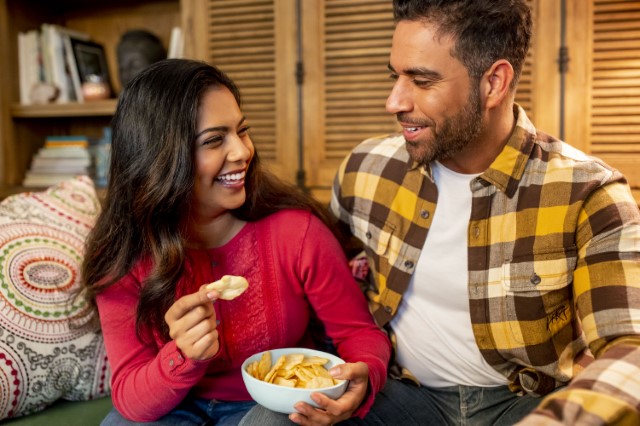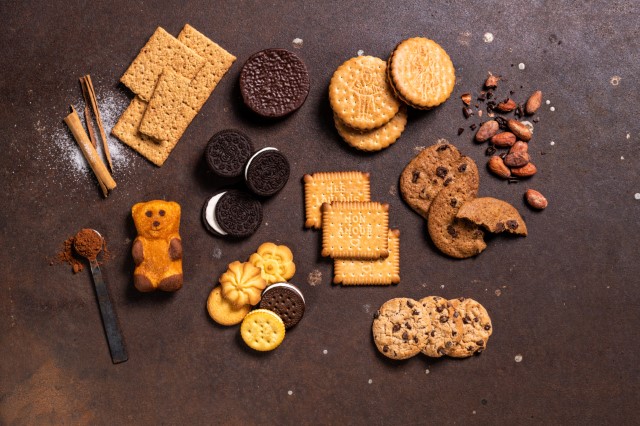
Not too long ago, a snack meant milk and cookies after school, but snacking has exploded in popularity and variety, to the point where it’s now considered a meal category of its own. With all that growth has come an increase in socially-conscious noshing, with snackers favoring foods produced and packaged responsibly and sustainably, according to the Third Annual State of Snacking Report released by Mondelēz International, one of the largest snack companies in the world.
“Consumers are growing more intentional about their purchase decisions as they become more in touch with their values,” Dirk Van de Put, CEO and chairman of Mondelēz International, wrote in the report. “They are making more of an effort to learn more about the brands or companies they buy from and becoming more discerning over the sustainable nature of the snacks they choose.”
Pandemic-induced lockdowns gave many consumers a chance to reflect on their food choices, and 80 percent of respondents to the State of Snacking report said they have become more aware of what they are buying, why they’re buying it and how it aligns with their values. How snacks are packaged has also grown in importance: 78 percent of respondents said they seek out low-waste packaging and 87 percent favor packaging that is easy to recycle.
“The findings in this report affirmed what we at Mondelēz International know to be true: Conscious consumption is increasingly top of mind for consumers, and they are becoming more intentional about their purchase decisions and aligning purchases with values,” Nick Graham, senior vice president for global insights and analytics at Mondelēz International, told TriplePundit. “Consumers are becoming more discerning over how the ingredients in their snacks are grown and the conditions under which they are produced and making choices to purchase snacks from companies with similar values.”

Consumers continue to seek out sustainable products, even amidst pandemic stress
The Mondelēz International report assesses consumer sentiment in the second year of the global pandemic — and it found that even as COVID-19 upended all aspects of daily life, consumers continued to scrutinize companies’ social responsibility commitments and production practices. Eighty-five percent of respondents said they either currently buy or are seeking to buy their snacks from companies that are committed to reducing their environmental impact, and 87 percent favor companies committed to fair labor practices.
Echoing those results, two-thirds of respondents to Trivium Packaging’s 2021 Buying Green Report labeled themselves as environmentally aware and said it was important to buy products in recyclable containers. Trivium’s report includes survey results from more than 15,000 consumers in Europe, North America and South America, and almost two-thirds (64 percent) said they put a priority on items that are packaged in recycled materials. Younger generations are more willing to spend extra money on packaging that is environmentally-friendly.
A Google Trends analysis included in the Mondelēz International report also cites environmental concerns and animal welfare as affecting shoppers' food buying choices.
How brands are responding to rising interest in sustainability
Organizations and businesses are hearing consumer preferences and addressing the urgent need to rework packaging and reduce plastic waste globally. Those efforts include the Ellen MacArthur Foundation’s Plastics Pact Network, a global group committed to developing a circular economy for plastics and "reducing the need for fossil-based plastics and other petrochemicals."
Reducing plastic waste, redesigning containers to use less plastic, and making recycling easier and more available are also among the missions of the Consumer Goods Forum, which fosters collaboration among manufacturers and retailers on a host of environmental and sustainability issues.
These efforts have drawn support from major brands and retailers like Mondelēz International, Coca-Cola, L’Oréal, Target and Walmart, which have pledged to work together to bring more sustainable packaging onto store shelves.

The future of sustainable snacking
The importance of packaging, production, and recyclability of snack products and containers will to continue to increase as snacking’s role in daily life grows. About 79 percent of those surveyed for the Mondelēz International report said their definition of a snack has evolved over the last three years to include “more or different types of foods, occasions for eating, or other elements.”
“Our State of Snacking report found that the definition of snacking is evolving among consumers globally, which is reshaping the meaning of snacking within people’s lives,” CEO Dirk Van de Put added in a press statement.
Part of the evolution of snacking is peoples’ growing preference for eating several small meals during the day rather than three big meals at breakfast, lunch and dinner, the report noted. Snacking is also increasingly seen as an acceptable indulgence, a way to treat oneself without going overboard on cash or calories.
“We make it a priority to constantly learn about the evolving role snacking plays in our consumers’ daily lives and rituals,” Graham told us. “The results of this report help us deliver on our purpose — to empower people to snack right and our mission at [Mondelēz International] to continue to lead the future of snacking by offering the right snack, for the right moment, made the right way.”
This article series is sponsored by Mondelēz International and produced by the TriplePundit editorial team.
Image credits: No Revisions/Unsplash and Mondelēz International

Ellen R. Delisio is a writer who lives in Long Island, NY. Over the past 30 years, her writing has focused on life science, sustainability, education issues and electric vehicles. Ellen is an avid reader and beach-goer.














